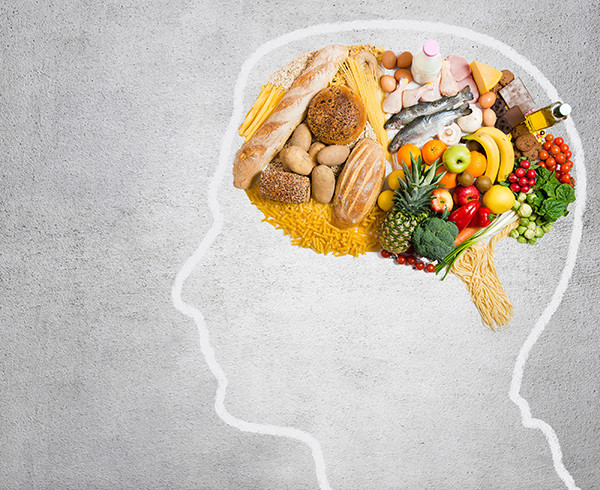
Examining the Link Between Nutrition and Cognitive Function
In the pursuit of optimal cognitive function and mental well-being, individuals often focus on various factors such as exercise, sleep, and mental stimulation. However, one aspect that is sometimes overlooked but holds significant importance is nutrition. The food we consume plays a crucial role in shaping not only our physical health but also our cognitive abilities and mental clarity. In this blog, we will delve into the fascinating connection between nutrition and cognitive function, exploring how different nutrients impact brain health and performance.
The Role of Nutrients in Cognitive Function: Nutrients are the building blocks of our body, and they also serve as fuel for our brain. Various vitamins, minerals, and other dietary components play specific roles in maintaining cognitive function:
- Omega-3 Fatty Acids: Omega-3 fatty acids, found abundantly in fatty fish, flaxseeds, and walnuts, are essential for brain health. They contribute to the structure of brain cell membranes and have been associated with improved cognitive function, memory, and mood regulation.
- Antioxidants: Antioxidants such as vitamin C, vitamin E, and flavonoids help protect the brain from oxidative stress and inflammation, which are linked to cognitive decline and neurodegenerative diseases like Alzheimer’s. Foods rich in antioxidants include berries, dark leafy greens, and nuts.
- B Vitamins: B vitamins, particularly folate, vitamin B6, and vitamin B12, play a crucial role in cognitive function by supporting nerve function and aiding in the synthesis of neurotransmitters. Deficiencies in these vitamins have been linked to cognitive impairment and mood disorders.
- Protein: Protein is essential for the production of neurotransmitters, the chemical messengers that facilitate communication between brain cells. Consuming adequate protein sources such as lean meats, poultry, eggs, and legumes can help maintain optimal cognitive function.
- Carbohydrates: While carbohydrates have received mixed reviews in recent years, they are the brain’s primary source of energy. However, not all carbohydrates are created equal. Choosing complex carbohydrates like whole grains, fruits, and vegetables over refined sugars can provide a steady supply of energy to the brain without causing spikes and crashes in blood sugar levels.
Impact of Diet on Brain Health: Mounting evidence suggests that the quality of our diet directly influences brain health and cognitive performance over the long term. Diets rich in processed foods, saturated fats, and sugars have been associated with cognitive decline, while diets high in fruits, vegetables, whole grains, and healthy fats are linked to better cognitive function and reduced risk of neurodegenerative diseases.
Furthermore, research indicates that certain dietary patterns, such as the Mediterranean diet and the DASH (Dietary Approaches to Stop Hypertension) diet, which emphasize whole foods, lean proteins, and unsaturated fats, are particularly beneficial for brain health. These diets are associated with lower rates of cognitive decline and a reduced risk of developing conditions like Alzheimer’s disease.

Practical Tips for Maintaining Brain-Healthy Nutrition: Incorporating brain-healthy foods into your diet doesn’t have to be complicated. Here are some practical tips to help you maintain optimal nutrition for cognitive function:
- Prioritize whole, nutrient-dense foods such as fruits, vegetables, whole grains, lean proteins, and healthy fats.
- Include fatty fish like salmon, trout, and mackerel in your diet regularly to boost omega-3 fatty acid intake.
- Minimize intake of processed foods, refined sugars, and trans fats, which can contribute to inflammation and oxidative stress.
- Stay hydrated by drinking plenty of water throughout the day, as dehydration can impair cognitive function.
- Consider incorporating brain-boosting snacks like nuts, seeds, and berries into your daily routine for a cognitive pick-me-up.
As students navigate the academic landscape, their cognitive function plays a pivotal role in their learning outcomes and overall academic success. Understanding the significant link between nutrition and cognitive function, MakeMyAssignments (MMA) stands as a valuable resource to assist students in optimizing their dietary habits to enhance brain health and academic performance. In this section, we will explore how MMA can support students in adopting brain-healthy nutrition practices.
- Personalized Nutrition Guidance: MMA recognizes that every student has unique dietary needs and preferences. Through personalized consultation services, MMA can provide tailored nutrition guidance to students, taking into account factors such as dietary restrictions, lifestyle habits, and academic demands. By offering personalized meal plans and dietary recommendations, MMA empowers students to make informed choices that support optimal cognitive function.
- Educational Resources: In addition to individualized guidance, MMA offers a wealth of educational resources to empower students with knowledge about the link between nutrition and cognitive function. Through informative articles, blog posts, and webinars, MMA equips students with the understanding of how different nutrients impact brain health and academic performance. By fostering awareness and education, MMA enables students to make conscious decisions about their dietary habits.
- Access to Brain-Boosting Foods: MMA understands the importance of convenient access to brain-boosting foods, especially for students with busy academic schedules. Through partnerships with local vendors and food suppliers, MMA can offer students access to high-quality, nutrient-dense foods such as fruits, vegetables, whole grains, and lean proteins. By facilitating access to these foods, MMA makes it easier for students to incorporate brain-healthy choices into their daily diet.
- Meal Delivery Services: Recognizing the challenges of meal preparation and time constraints faced by students, MMA offers meal delivery services that prioritize nutrition and convenience. Students can choose from a variety of nutritious meal options curated by nutrition experts, ensuring they receive the essential nutrients needed to support cognitive function. By offering convenient meal solutions, MMA helps students maintain a balanced diet even during hectic academic periods.
- Promoting Holistic Well-being: Beyond nutrition, MMA recognizes the importance of supporting students’ holistic well-being to enhance cognitive function. Through partnerships with wellness experts, MMA offers resources and services such as stress management techniques, mindfulness practices, and physical activity recommendations. By promoting holistic well-being, MMA empowers students to optimize their cognitive function and excel academically.
In conclusion, MakeMyAssignments plays a crucial role in supporting students’ efforts to improve cognitive function through nutrition. By offering personalized guidance, educational resources, access to brain-boosting foods, meal delivery services, and holistic well-being support, MMA equips students with the tools and resources needed to prioritize brain-healthy nutrition. Through these initiatives, MMA helps students enhance their cognitive function, optimize academic performance, and achieve their academic goals.





